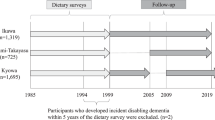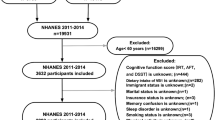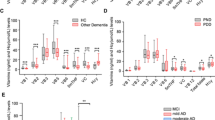Abstract
Background/Objectives
Low intake of B vitamins may increase dementia; However, epidemiological evidence, particularly for riboflavin (vitamin B₂), remains sparse. This study aimed to examine the association between dietary intakes of B vitamins (riboflavin, vitamin B6, vitamin B12, and folate) and the incidence of disabling dementia necessitating care under Japan’s national insurance over a 15-year observation period.
Methods
As part of the Circulatory Risk in Communities Study, a prospective study involving a community-based cohort of 4171 Japanese individuals aged 40–69 years was conducted. Dietary intakes of B vitamins were estimated through a single 24-h dietary recall method. Disabling dementia was defined by the daily living disability status related to dementia based on the long-term care insurance system of Japan. Hazard ratios of disabling dementia were estimated using area-stratified Cox proportional hazard models.
Results
Over a median follow-up of 15.4 years, 887 cases of disabling dementia were identified. Riboflavin intake was inversely associated with the risk of disabling dementia; the multivariable hazard ratio for the highest versus lowest quartiles was 0.51 (95% CI 0.42–0.63; P for trend <0.001). A similar inverse association was observed for vitamin B6 and folate intakes, with multivariable hazard ratios of 0.80 (0.66–0.97; P for trend = 0.01) and 0.79 (0.65–0.96; P for trend <0.001), respectively.
Conclusions
Our findings suggest that dietary intake of B vitamins, especially riboflavin, vitamin B6, and folate, is associated with a reduced risk of disabling dementia in Japanese individuals.
This is a preview of subscription content, access via your institution
Access options
Subscribe to this journal
Receive 12 print issues and online access
$259.00 per year
only $21.58 per issue
Buy this article
- Purchase on SpringerLink
- Instant access to full article PDF
Prices may be subject to local taxes which are calculated during checkout

Similar content being viewed by others
Data availability
The datasets generated during and/or analyzed during the current study are not publicly available but are available from the corresponding author upon reasonable request and with the permission of the cohort committee.
References
Reynolds E. Vitamin B12, folic acid, and the nervous system. Lancet Neurol. 2006;5:949–60.
Calderon-Ospina CA, Nava-Mesa MO. B Vitamins in the nervous system: current knowledge of the biochemical modes of action and synergies of thiamine, pyridoxine, and cobalamin. CNS Neurosci Ther. 2020;26:5–13.
Smith AD, Refsum H. Homocysteine, B vitamins, and cognitive impairment. Annu Rev Nutr. 2016;36:211–39.
Powers HJ. Riboflavin (vitamin B-2) and health. Am J Clin Nutr. 2003;77:1352–60.
Moat SJ, Ashfield-Watt PA, Powers HJ, Newcombe RG, McDowell IF. Effect of riboflavin status on the homocysteine-lowering effect of folate in relation to the MTHFR (C677T) genotype. Clin Chem. 2003;49:295–302.
Seshadri S, Beiser A, Selhub J, Jacques PF, Rosenberg IH, D’Agostino RB, et al. Plasma homocysteine as a risk factor for dementia and Alzheimer’s disease. N Engl J Med. 2002;346:476–83.
Agnew-Blais JC, Wassertheil-Smoller S, Kang JH, Hogan PE, Coker LH, Snetselaar LG, et al. Folate, vitamin B-6, and vitamin B-12 intake and mild cognitive impairment and probable dementia in the Women’s Health Initiative Memory Study. J Acad Nutr Diet. 2015;115:231–41.
Corrada MM, Kawas CH, Hallfrisch J, Muller D, Brookmeyer R. Reduced risk of Alzheimer’s disease with high folate intake: the Baltimore Longitudinal Study of Aging. Alzheimers Dement. 2005;1:11–8.
Luchsinger JA, Tang MX, Miller J, Green R, Mayeux R. Relation of higher folate intake to lower risk of Alzheimer disease in the elderly. Arch Neurol. 2007;64:86–92.
Nelson C, Wengreen HJ, Munger RG, Corcoran CD. Dietary folate, vitamin B-12, vitamin B-6 and incident Alzheimer’s disease: the Cache County Memory, Health and Aging Study. J Nutr Health Aging. 2009;13:899–905.
Lefevre-Arbogast S, Feart C, Dartigues JF, Helmer C, Letenneur L, Samieri C. Dietary B vitamins and a 10-year risk of dementia in older persons. Nutrients. 2016;8:671.
Wang Z, Zhu W, Xing Y, Jia J, Tang Y. B vitamins and prevention of cognitive decline and incident dementia: a systematic review and meta-analysis. Nutr Rev. 2021;80:931–49.
Kimura Y, Yoshida D, Ohara T, Hata J, Honda T, Hirakawa Y, et al. Long-term association of vegetable and fruit intake with risk of dementia in Japanese older adults: the Hisayama study. BMC Geriatr. 2022;22:257.
Wang Y, Mi N, Liao K, Li Y, Sun Y, Xie P. et al. Associations among dietary 1-carbon metabolism nutrients, genetic risk, and Alzheimer disease: a prospective cohort study. Am J Clin Nutr. 2024;120:1009–18.
Yamagishi K, Muraki I, Kubota Y, Hayama-Terada M, Imano H, Cui R, et al. The Circulatory Risk in Communities Study (CIRCS): a long-term epidemiological study for lifestyle-related disease among Japanese men and women living in communities. J Epidemiol. 2019;29:83–91.
Ikeda A, Yamagishi K, Tanigawa T, Cui R, Yao M, Noda H, et al. Cigarette smoking and risk of disabling dementia in a Japanese rural community: a nested case-control study. Cerebrovasc Dis. 2008;25:324–31.
Noda H, Yamagishi K, Ikeda A, Asada T, Iso H. Identification of dementia using standard clinical assessments by primary care physicians in Japan. Geriatr Gerontol Int. 2018;18:738–44.
Iso H, Terao A, Kitamura A, Sato S, Naito Y, Kiyama M, et al. Calcium intake and blood pressure in seven Japanese populations. Am J Epidemiol. 1991;133:776–83.
Ministry of Education, Culture, Sports, Science and Technology. Standard tables of food compusition in Japan. Japan: Official Gazette Co-operation of Japan; 2015.
Willett WC, Howe GR, Kushi LH. Adjustment for total energy intake in epidemiologic studies. Am J Clin Nutr. 1997;65:1220S–8S. discussion 9S-31S.
Imano H, Iso H, Kiyama M, Yamagishi K, Ohira T, Sato S, et al. Non-fasting blood glucose and risk of incident coronary heart disease in middle-aged general population: the Circulatory Risk in Communities Study (CIRCS). Prev Med. 2012;55:603–7.
Qin B, Xun P, Jacobs DR Jr, Zhu N, Daviglus ML, Reis JP, et al. Intake of niacin, folate, vitamin B-6, and vitamin B-12 through young adulthood and cognitive function in midlife: the Coronary Artery Risk Development in Young Adults (CARDIA) study. Am J Clin Nutr. 2017;106:1032–40.
Guenther BD, Sheppard CA, Tran P, Rozen R, Matthews RG, Ludwig ML. The structure and properties of methylenetetrahydrofolate reductase from Escherichia coli suggest how folate ameliorates human hyperhomocysteinemia. Nat Struct Biol. 1999;6:359–65.
Jacques PF, Bostom AG, Wilson PW, Rich S, Rosenberg IH, Selhub J. Determinants of plasma total homocysteine concentration in the Framingham Offspring cohort. Am J Clin Nutr. 2001;73:613–21.
McNulty H, Dowey le RC, Strain JJ, Dunne A, Ward M, Molloy AM, et al. Riboflavin lowers homocysteine in individuals homozygous for the MTHFR 677C->T polymorphism. Circulation. 2006;113:74–80.
Wilson CP, McNulty H, Ward M, Strain JJ, Trouton TG, Hoeft BA, et al. Blood pressure in treated hypertensive individuals with the MTHFR 677TT genotype is responsive to intervention with riboflavin: findings of a targeted randomized trial. Hypertension. 2013;61:1302–8.
Ashoori M, Saedisomeolia A. Riboflavin (vitamin B(2)) and oxidative stress: a review. Br J Nutr. 2014;111:1985–91.
Betz AL, Ren XD, Ennis SR, Hultquist DE. Riboflavin reduces edema in focal cerebral ischemia. Acta Neurochir Suppl. 1994;60:314–7.
Hoane MR, Wolyniak JG, Akstulewicz SL. Administration of riboflavin improves behavioral outcome and reduces edema formation and glial fibrillary acidic protein expression after traumatic brain injury. J Neurotrauma. 2005;22:1112–22.
Durga J, van Boxtel MP, Schouten EG, Kok FJ, Jolles J, Katan MB, et al. Effect of 3-year folic acid supplementation on cognitive function in older adults in the FACIT trial: a randomised, double blind, controlled trial. Lancet. 2007;369:208–16.
Jacques PF, Selhub J, Bostom AG, Wilson PW, Rosenberg IH. The effect of folic acid fortification on plasma folate and total homocysteine concentrations. N Engl J Med. 1999;340:1449–54.
Jayedi A, Zargar MS. Intake of vitamin B6, folate, and vitamin B12 and risk of coronary heart disease: a systematic review and dose-response meta-analysis of prospective cohort studies. Crit Rev Food Sci Nutr. 2019;59:2697–707.
Ntaios G, Savopoulos C, Grekas D, Hatzitolios A. The controversial role of B-vitamins in cardiovascular risk: an update. Arch Cardiovasc Dis. 2009;102:847–54.
Kishida R, Yamagishi K, Ikeda A, Hayama-Terada M, Shimizu Y, Muraki I. et al. Serum folate and risk of disabling dementia: a community-based nested case-control study. Nutr Neurosci. 2024;27:470–76.
Hsu CY, Chiu SW, Hong KS, Saver JL, Wu YL, Lee JD, et al. Folic acid in stroke prevention in countries without mandatory folic acid food fortification: a meta-analysis of randomized controlled trials. J Stroke. 2018;20:99–109.
Yamagishi K, Maruyama K, Ikeda A, Nagao M, Noda H, Umesawa M, et al. Dietary fiber intake and risk of incident disabling dementia: the Circulatory Risk in Communities Study. Nutr Neurosci. 2023;26:148–55.
Ministry of Health, Labour and Welfare. Long-term Care Need Certification. 2004. https://www.mhlw.go.jp/topics/kaigo/kaigi/040219/2-2d.html.
Ministry of Health, Labour and Welfare. Certification of long-term care need. 2025. https://www.mhlw.go.jp/stf/seisakunitsuite/bunya/hukushi_kaigo/kaigo_koureisha/nintei/index.html.
Ministry of Health, Labour and Welfare. The National Health and Nutrition Survey in Japan. 2001. https://www.mhlw.go.jp/toukei/kouhyo/indexkk_14_8.html.
Acknowledgements
The authors thank the healthcare staff of Ikawa, Yao, and Kyowa. The authors would also like to thank Thomas Mayers of the Medical English Communication Center, University of Tsukuba, for language revision.
Funding
This study was partly supported by Health and Labour Science Research Grants for Dementia grant numbers H21-Ninchisho-Wakate-007 and H24-Ninchisho-Wakate-003, and for Comprehensive Research on Cardiovascular Disease and Life–Related Disease grant numbers 20FA1002 and 23FA1006, Ministry of Health, Labour and Welfare, Japan; JSPS KAKENHI grant numbers 26253043, 17H04121, 18H04077, 18K10097, 21H03194, 23K21515 and 25H01090; and Japan FULLHAPP.
Author information
Authors and Affiliations
Contributions
Conception and design of the study: RK, KY, and H Iso; Analysis of data: RK; Drafting the article: RK, KY, and H Iso; Involved in data collection, interpretation of the data, and critical revision of the manuscript: RK, KY, KM, AI, MS, MT, CO, YK, MH, YS, IM, MU, H Imano, TS, TO, AK, MK, H Iso.
Corresponding author
Ethics declarations
Competing interests
The authors declare no competing interests.
Ethics approval and consent to participate
The institutional review boards of the Osaka Institute of Public Health (No. 2409-02), Kindai University (No. R04-255), Osaka University (No. 14285-13), and University of Tsukuba (No. 2047-1) approved the study procedure. This study conformed to the principles of the Declaration of Helsinki. Informed consent was obtained from community leaders. Based on the nature of the study as a secondary use of data initially obtained for public health practice on cardiovascular disease prevention within the local community, individual consent was not required for the analysis. In compliance with relevant guidelines and regulations, the participants were retrospectively allowed to opt out of the analysis. If participants did not decline participation in this study, their consent for data usage was assumed.
Additional information
Publisher’s note Springer Nature remains neutral with regard to jurisdictional claims in published maps and institutional affiliations.
Supplementary information
Rights and permissions
Springer Nature or its licensor (e.g. a society or other partner) holds exclusive rights to this article under a publishing agreement with the author(s) or other rightsholder(s); author self-archiving of the accepted manuscript version of this article is solely governed by the terms of such publishing agreement and applicable law.
About this article
Cite this article
Kishida, R., Yamagishi, K., Maruyama, K. et al. Dietary intake of folate, vitamin B6, vitamin B12, and riboflavin and the risk of incident dementia. Eur J Clin Nutr (2025). https://doi.org/10.1038/s41430-025-01663-5
Received:
Revised:
Accepted:
Published:
DOI: https://doi.org/10.1038/s41430-025-01663-5



